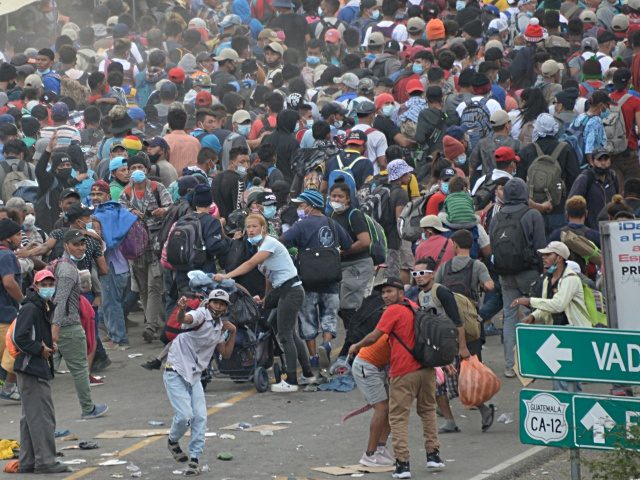President Joe Biden’s spokeswoman has conceded that Central American countries have not made “commitments” to stem the northward migration, despite her April 12 claims.
Spokeswoman Jen Psaki and Special Assistant to the President for Immigration for the Domestic Policy Council,Tyler Moran first claimed April 12 to have won “commitments” from Mexico, Honduras, and Guatemala to deploy more border guards to stem the U.S.-bound migrant flows within their territories.
That same day, Breitbart News learned from comments buried in a report by the Associated Press (AP) that Honduras and Guatemala had indicated that they had not officially agreed to any deal.
Two days later, the Biden administration’s special envoy for the Northern Triangle acknowledged to House lawmakers that the U.S. had not reached any border security “agreements.”
By last Friday, Psaki was dancing around whether or not the Biden administration had formally convinced Guatemala and Honduras, part of the Northern Triangle region in Central America fueling the migrant surge at the U.S. southern border, to help combat the migrant flows heading to the U.S.
She told reporters:
Whether or not it was a formal agreement — which it was not, and I never conveyed that it was — these were steps that these countries indicated they planned to take to increase personnel and security to reduce the number of migrants coming across the border. Those are steps they’ve taken on the ground.
Asked whether these were new commitments that the Biden administration had secured or whether they were already in existence as indicated by Guatemala, Psaki retorted, “We never described it as a formal declaration or a formal agreement, but additional steps that they were taking to increase personnel at the border. And those are steps you can confirm with those countries that they have taken.”
On April 12, Psaki and Moran touted the alleged agreements with Mexico, Guatemala, and Honduras to boost the deployment of border guards within their territories.
Psaki told reporters:
There have been a series of bilateral discussions between our leadership and the regional governments of Mexico, Honduras, and Guatemala. Through those discussions, there was a commitment, as you mentioned, to increase border security.
So, Mexico made the decision to maintain 10,000 troops at its southern border, resulting in twice as many daily migrant interdictions. Guatemala surged 1,500 police and military personnel to its southern border with Honduras and agreed to set up 12 checkpoints along the migratory route. Honduras surged 7,000 police and military to disperse a large contingent of migrants.
Moran explicitly said the Biden administration had “secured agreements” with Latin American allies to increase border security amid the migrant surge overwhelming resources at the American side of the U.S.-Mexico international boundary.
“Mexico, Honduras, and Guatemala have all agreed to do this. That not only is going to prevent the traffickers and the smugglers and cartels that take advantage of the kids on their way here but also to protect those children,” he told MSNBC Monday.
On the same day, Honduras denied making any commitments, and Guatemala said it had not signed any deal, AP reported.
Specifically, Guatemalan presidential spokeswoman Patricia Letona declared in a press release that the Central American country had not signed any agreement to deploy more border guards, adding that it had undertaken border security efforts since last year “on its own initiative,” as mandated by its constitution.
The Honduran government added that it was just exploring the prospects of sending more police and military personal to its border to prevent people from heading to the United States, stressing it had made “no commitment” to deploy more border guards.
Meanwhile, the Mexican government noted that it would “maintain the existing deployment of federal forces in its border area.”
Two days later, last Wednesday, the Biden administration’s special envoy for the Northern Triangle, Ricardo Zúñiga, testified before the House Foreign Affairs Committee that no “agreements” had been “concluded with governments regarding border security.”
Notably left out from the border security discussions touted by the White House last week was El Salvador, which is also part of the Northern Triangle region, a top source of illegal migrants in the United States.
Salvadoran President Nayib Bukele worked with former President Donald Trump on reducing illegal migration, likely drawing the ire of Democrats.
Early this month, Bukele refused to meet with Biden’s special envoy for the Northern Triangle, over what the popular Salvadoran president described as personal affronts from Democrats and the Biden administration, including calling him a dictator.

COMMENTS
Please let us know if you're having issues with commenting.